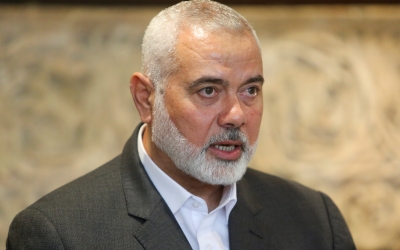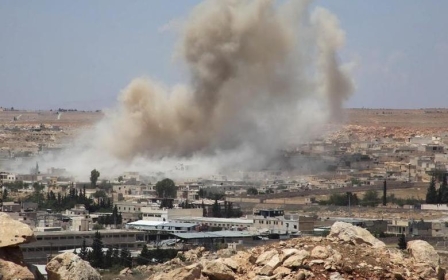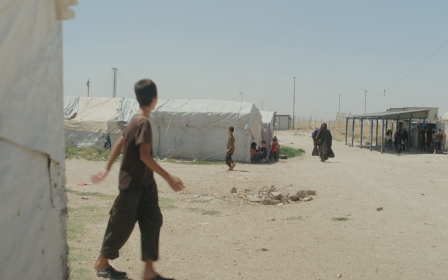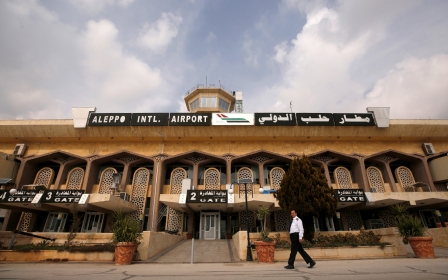Hamas decision to restore ties with Syrian government sparks controversy

The decision by Hamas, the Palestinian movement that rules the Gaza Strip, to restore relations with the Syrian government after more than 10 years of estrangement has sparked controversy.
After initially remaining neutral in the country's civil war, Hamas eventually voiced its support for the Syrian opposition in 2012 and broke off links with President Bashar al-Assad, despite having received backing from his government in the past.
The move also saw the group transfer its leadership from Damascus to Doha.
Last week, however, the Hamas leadership announced it was restoring ties with Assad's government.
In an official statement condemning the repeated Israeli bombing of various areas in Syria, Hamas said they appreciated "the Syrian leadership and people for supporting the Palestinian people and their just cause".
New MEE newsletter: Jerusalem Dispatch
Sign up to get the latest insights and analysis on Israel-Palestine, alongside Turkey Unpacked and other MEE newsletters
'Hamas confirms that it goes ahead with its decision to restore ties with the Syrian Arab Republic to serve the interest of the Arab and Islamic Ummah'
- Hamas statement
"Hamas confirms that it goes ahead with its decision to restore ties with the Syrian Arab Republic to serve the interest of the Arab and Islamic Ummah, above all the Palestinian cause, especially in light of the escalating regional and international developments concerning the Palestinian cause," said the statement.
"We look forward to the day when Syria restores its leading position in the Arab and Islamic Ummah. Hamas supports all sincere efforts aimed to achieve peace, stability, and prosperity in Syria.”
The decision to restore ties with the Syrian government is a risky one for Hamas, not least due to the widespread support for the Syrian opposition amongst Palestinians in Gaza.
An informed source inside Hamas clarified that the decision to restore ties with Syria was approved by all but one member of the General Political Bureau.
The source, who declined to be named, told Middle East Eye: "There was a continuous discussion between Hamas's internal institutions about the decision, and the General Political Bureau took its decision to engage in negotiations to restore relations with Syria."
The move to rebuild relations between Damascus and Hamas has been several years in the making.
The deputy head of Hamas in the Gaza Strip, Khalil al-Hayya, confirmed to the Lebanese newspaper al-Akhbar last June that a decision had been taken to "restore the relationship with Damascus" after "an internal and external discussion" involving leaders, cadres, influencers, "and even detainees inside Israeli prisons".
Al-Hayya said that "the circumstances, timing and form were discussed" and "a plan was drawn up that will be implemented with the help of allies", adding that "there is a trend towards the broader environment, which includes stakeholders, thinkers and scholars, and then the broader popular frameworks".
He said that they had also raised the issue with Turkey and Qatar, two major Hamas sponsors, and neither had opposed the move.
MEE tried to communicate with Hamas officials in Gaza and abroad, but they refused to comment on Hamas's statement regarding the restoration of relations with Syria.
A 'moral sin'
Though the public is not privy to any controversy over the issue that might have arisen inside Hamas, a number of people and groups otherwise supportive of the organisation have expressed their dismay at the decision to rebuild ties with Syria.
Saleh al-Naami, a political writer close to Hamas in Gaza, described the move to restore relations with the "petty tyrant" Assad as a "moral sin".
"This decision not only contradicts the nation's expectations of Hamas, but does not express the position of the movement's cadres and the vast majority of its elites," he said.
'[Hamas has] two options: either to remain alone in light of Arab-Israeli normalisation and the return of relations between Turkey and Israel, or to return to the alliance between Iran, Syria and Hezbollah'
- Mukhaimar Abu Saada, analyst
"This step could have been understood, according to the calculations of political realism and strategic requirements, if it had given the movement new bases to launch its resistance work in a way that would reduce the burden on its current arenas. But at a time when the Zionists are constantly targeting the regime and the Iranian presence in Syria, this bet cannot be realistic."
Palestinian writer Muhammad Khair Musa, who resides in Turkey, also wrote on his Twitter account Hamas's move was "unfortunate and painful" and what was "presented in the context of justifying the restoration of the relationship is nothing more than illusory and unreal interests".
Some political analysts, however, believe that Hamas simply does not have the luxury of refusing detente with Syria.
Hamas maintains close relations with Iran, the main ally of Syria, which provides it with money, weapons and other logistical support. Hamas also still maintains good relations with Hezbollah, Syria's main ally in Lebanon.
At the same time, a number of Arab countries, including some that were previously supportive of the Palestinian cause, have signed normalisation deals with Israel, including the United Arab Emirates, Bahrain and Morocco, while Turkey has also restored relations after years of tensions.
Mukhaimar Abu Saada, a professor of political science at Al-Azhar University in Gaza, told MEE that Hamas was stuck "between two options: either to remain alone in light of Arab-Israeli normalisation and the return of relations between Turkey and Israel, or to return to the alliance between Iran, Syria and Hezbollah.
"Hamas believes the regime has ended the battle inside Syria, and that the regime has begun to return to the Arab League, as well as the return of ambassadors of some Arab countries to Damascus, indicates that the regime remains, therefore Hamas is concerned about standing outside."
Few options for Hamas
A leading source in Hamas told MEE that Iran and Hezbollah had made strenuous efforts to restore relations between Hamas and Syria over the past months and years.
He said there were two main sticking points for Syria before it would reconnect with Hamas: it wanted an apology for the Palestinian group's position on the war in Syria, and would not allow certain personalities to enter the country again, most notably senior leader Khaled Meshaal.
"Hamas categorically refused to apologise, and it was agreed to issue a statement confirming support for the Syrian leadership, and this is what the latest statement expressed," the source explained.
He said he expected that a Hamas delegation would visit Syria in the coming days, led by Musa Abu Marzouk or Khalil al-Hayya, and not the head of the political bureau, Ismail Haniyeh, at this stage.
Hamas does not expect its leadership to return to residing in Syria due to the security situation as a result of the Israeli bombing and the instability in different parts of Syria between the government and other forces.
"Syria is no longer what it was before, and the security situation is difficult, and the leadership will not return to reside there. Restoring relations is political and logistical in order to strengthen alliances in the region," he said.
This article is available in French on Middle East Eye French edition.
Middle East Eye delivers independent and unrivalled coverage and analysis of the Middle East, North Africa and beyond. To learn more about republishing this content and the associated fees, please fill out this form. More about MEE can be found here.





